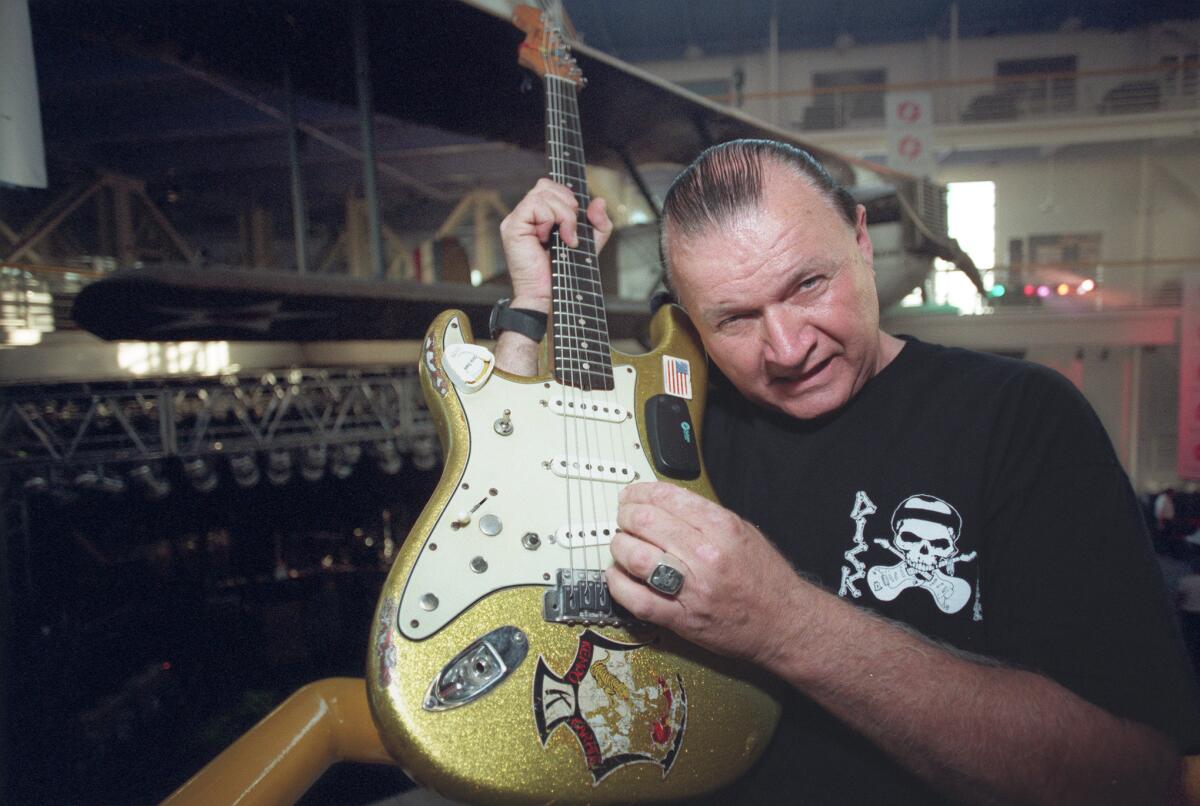Surf rocker Dick Dale shaped the sound of Southern California — and spread it to the world

- Share via
Dick Dale played electric guitar like he was more interested in the electricity than in the guitar.
Listen to the way he starts his signature song, “Misirlou,” with the sound of his pick slicing against a quivering string — a power line, basically — to create the audible equivalent of sparks.
The tune is a traditional Arabic melody that Dale, born Richard Monsour, picked up during his childhood outside Boston as the son of an immigrant father from Lebanon. But when he adapted the song in the early 1960s, the guitarist cranked the tempo and the volume so that it seemed to crackle with fresh adventure.
Decades later, Dale’s take on “Misirlou” still carried enough live-wire energy that filmmaker Quentin Tarantino cut to it in 1994’s “Pulp Fiction” just as he’s showing us two robbers whipping out their guns to stick up a coffee shop.
“I think the original people that did it are probably turning over in their grave when they heard it the way I play it,” the guitarist told NPR around the time of the movie.
Perhaps.
But in doing “Misirlou” his way, Dale — who died Saturday at age 81 — helped birth a new American sound: surf music, which with its hurtling grooves and overdriven tremolo brought listeners around the world into the psychic landscape of Dale’s adopted home of Southern California.

His playing influenced countless other musicians, including the Beach Boys, who famously added harmonized vocals to surf music but still made room for a version of the instrumental “Misirlou” on their “Surfin’ USA” album in 1963. (Followers of vintage West Coast pop will note that Dale’s death comes just a week after that of Hal Blaine, whose drumming powered many of the Beach Boys’ hits.)
And that California vibe went global — sometimes spread by U.S. Armed Forces Radio — to places as far-flung as Japan, Peru and Southeast Asia, the last of which spawned its own robust psych-rock scene.
Yet despite how widely he was imitated, the intensity of Dale’s sound ensured that he remained an instantly identifiable presence — and not only during surf music’s brief commercial peak, when copycats were hurrying to cash in before the Beatles and the Rolling Stones forced a wipeout.
Put on “Tribal Thunder,” released in 1993, to get a sense of how he could still make his strings scream well into middle age.
In addition to his family’s roots in the Middle East, Dale had the ocean in mind as he developed his style. A real-deal surfer (as opposed to most of the Beach Boys), he often said he was seeking to capture what it felt like to be inside a wave.
And to get that vast, pummeling sound, he used strings far thicker than most guitarists’ — and attacked them much harder.
“Mick Fleetwood of Fleetwood Mac once said to me, ‘My God, you’re the most percussive guitarist I’ve ever seen in my life,’” Dale told “Fresh Air’s” Terry Gross with obvious pride, and indeed one of the guitarist’s earliest inspirations was Gene Krupa, the splashy big-band drummer.
Dale also worked with Leo Fender, whose namesake Fullerton-based company cemented the electric guitar’s place in rock music, to create specialized instruments, including a custom Stratocaster nicknamed the Beast, and amplifiers that could deliver the roar he heard in his head.
In that quest for new tones and textures, Dale laid the groundwork for later guitarists from well beyond the realm of surf music — players such as Eddie Van Halen and Sonic Youth’s Thurston Moore, who took up Dale’s belief that the instrument had revealed only a fraction of what it could do (and only a fraction of the abuse it could take).
He also inspired future generations of surf preservationists, from Best Coast to Ty Segall to Orange County’s Growlers, who put on a local festival every year called Beach Goth.
Yet Dale’s forward-facing stance didn’t prevent him from looking back when the time — or the price — was right.
Many younger fans were introduced to the guitarist when he turned up in “Back to the Beach,” the 1987 movie comedy that reunited him with Frankie Avalon and Annette Funicello, with whom he’d appeared in ’60s-era teensploitation flicks like “Beach Party.”
For the film’s soundtrack, Dale recorded the Chantays’ surf classic “Pipeline” with Stevie Ray Vaughan, and if the guy was ever presented with an opportunity to coast, the song’s music video — with Dale in big hair and a salmon-colored suit — would seem to have been it.
Listen to his lightning-strike playing, though, and it’s clear he was still plugged in.
Twitter: @mikaelwood
More to Read
The biggest entertainment stories
Get our big stories about Hollywood, film, television, music, arts, culture and more right in your inbox as soon as they publish.
You may occasionally receive promotional content from the Los Angeles Times.











